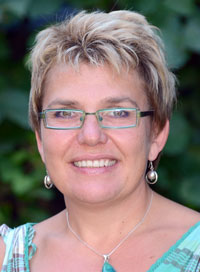UBC’s Okanagan campus School of Nursing is building on a foundation of community engagement and global development work to offer students a full, interdisciplinary course of study for both undergraduate and graduate students.
With record first-year enrolment of 122 students from across Canada, the School of Nursing will have 454 students across its four-year program in 2011-12, the highest number ever. There are more opportunities for graduate and collaborative research and interdisciplinary study so students can gain an essential understanding of people within the context of health and healing.
This year UBC also begins partnering with Okanagan College (OC) to educate nurses in the Interior. The college will see 24 nurses admitted into its new Department of Nursing. These students will take their first two years at OC and will transfer to UBC’s Okanagan campus to join third and fourth-year students to complete their Bachelor of Science in Nursing (BSN). The BSN also has access points for Licensed Practical Nurses and Registered Nurses who want to complete a baccalaureate degree in nursing.
The school is also engaged in community development work that includes student placements in Ghana and Zambia and continues faculty development and collaboration with the Royal Institute of Nursing in Batala, Punjab, India.
The School of Nursing offers a supportive admission program for Aboriginal students that provides mentoring and support to Aboriginal nursing students, working with Aboriginal Services to create better pathways for Aboriginal students to enter the program and be successful.
Nurses can carry their education further through the Master of Science in Nursing (MSN) program. The objectives of the MSN program are to cultivate leadership, enhance theoretical knowledge, develop scholarly inquiry and scholarship and advance the professional practices of baccalaureate nurses.
Among other technology improvements, another high-fidelity human patient simulator has been added so that students can learn within a human patient simulation program that has been fully integrated into the curriculum.
There will be a change in leadership in November with new director Patricia Marck and associate director Sheila Epp beginning their roles. This will enable acting director Jeanette Vinek to return to a teaching role.

Jeanette Vinek
“The School of Nursing is committed to improving students’ experience. We have developed a strong partnership with the Learning Center to provide tutorials specific to nursing classes and we provide undergraduate teaching assistant opportunities to work with first-year students in the nursing lab. We work closely with the Global Nursing Citizens Committee, which is a student led/driven club that works with communities in Ghana and Zambia. We also have strong ties to the Nursing Course Union. We provide opportunities for our students to volunteer in the Health Fair on campus. This year, we will have students volunteering at the campus flu clinic. We have a very strong teaching faculty that is committed to educating nurses.
“We see our students as our family. We are co-learners, providing new and innovative opportunities in clinical practice and we are provincial leaders in integrating human patient simulation experiences into the Nursing curriculum.”
— Acting Director Jeanette Vinek
— 30 —